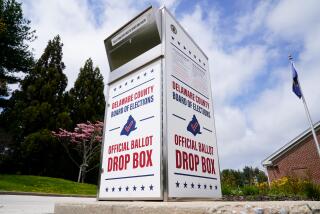Negative Ads Beat Bush to Missouri
WASHINGTON — Even before President Bush swung through western Missouri on Monday to talk up his prescription drug program, Democratic foes were pounding him in local newspaper and radio advertisements meant to knock the incumbent’s campaign off guard.
The ads by the Media Fund, a liberal group seeking to help presumptive Democratic presidential nominee Sen. John F. Kerry, underscored a tactic likely to become more popular with political operatives increasingly schooled in preemptive attacks.
The group’s full-page newspaper ad appeared in the Kansas City Star. A 60-second companion spot aired on radio programs during the morning commute. Both denounced Bush’s healthcare and economic policies hours before Air Force One touched down at Kansas City International Airport. The president then headed to an afternoon event in nearby Liberty, Mo.
The ads accused Bush of presiding over the loss of more than 30,000 jobs in Missouri and of promoting healthcare policies that shortchange children, families and the elderly.
“The president flies home tonight,” the radio ad said. “But he leaves behind a state that is neither stronger, safer or better than it was four years ago.”
The Bush campaign noted that in Missouri, job growth has been strong in recent months, as is the case nationwide. The campaign also sought to stick to its daily message: that a new government-issued prescription drug discount card will benefit millions of elderly and disabled people covered by Medicare.
The Bush reelection team used the same preemptive technique in March, when it ran television ads in West Virginia that attacked Kerry’s record on defense issues as the Massachusetts senator stumped in the state.
The Media Fund, which is headed by veteran Democratic strategists but operates separately from the Kerry campaign, responded in kind when Bush went to West Virginia in May.
The Democratic group said Monday it had set aside a “large budget” for similarly targeted attacks in coming months that would be launched when it got enough advance notice of presidential trips.
“It’s really a relatively simple idea,” said the group’s executive director, Erik Smith. “Use a modest investment to try to make a big impact.”
“This is a relatively new phenomenon,” said William Benoit, a professor of communications at the University of Missouri who studies presidential ads. “It shows how intense the campaign is and the extent to which [the two sides] are trying to target very specific audiences. They’re doing a lot of audience analysis, to get more bang for their buck. I’m sure you’re going to see more of this.”
More to Read
Get the L.A. Times Politics newsletter
Deeply reported insights into legislation, politics and policy from Sacramento, Washington and beyond. In your inbox three times per week.
You may occasionally receive promotional content from the Los Angeles Times.










